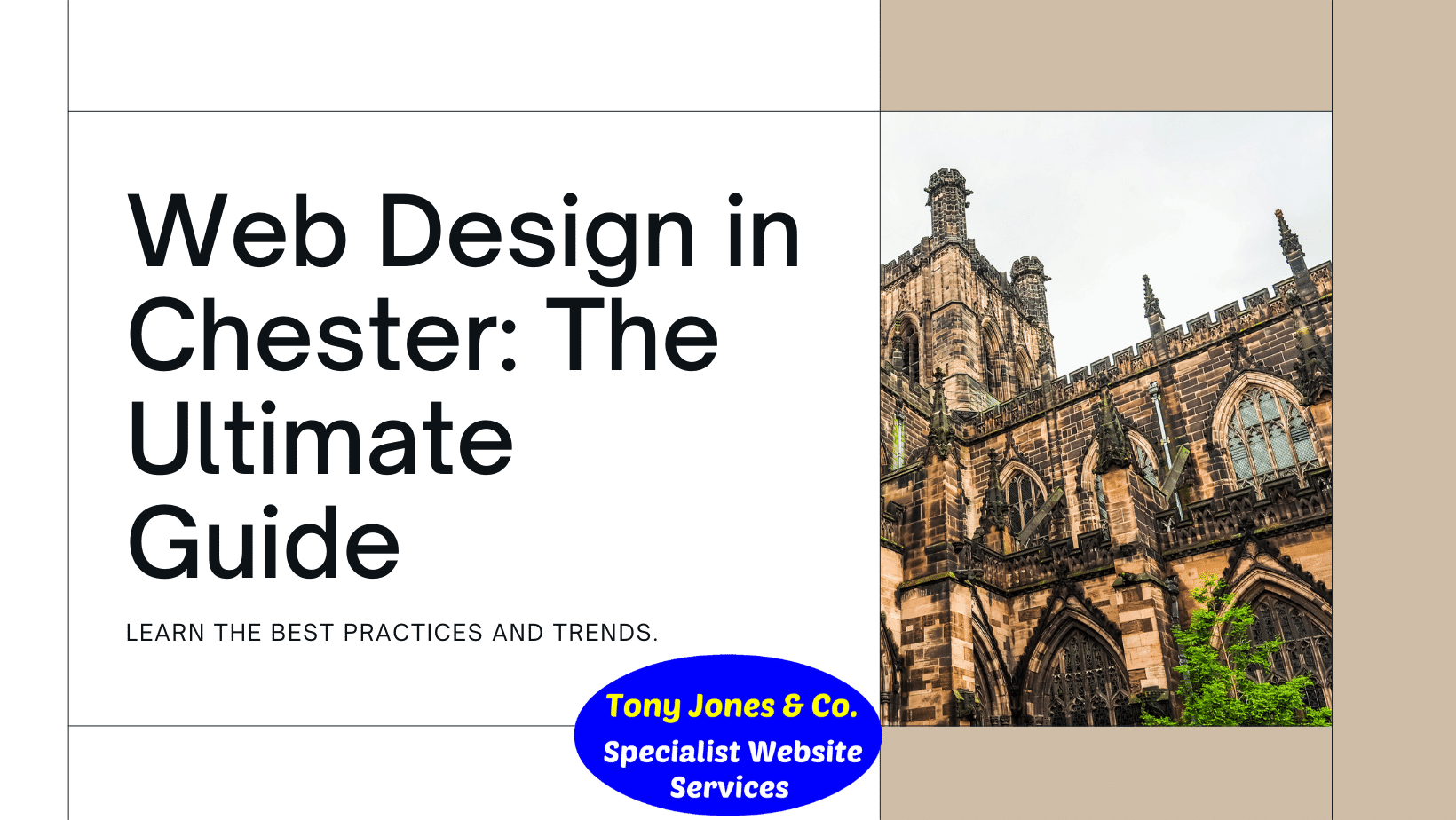Web Designer Wrexham, Professional Website Services - Tony Jones CITP, FBCS.
Mastering the Game: Unveiling the Google Page One Ranking Strategy
Unlock the secrets to Google page one ranking! Learn the essential strategy to elevate your online presence and dominate search results.

The Importance of Google Page One Ranking
When it comes to online visibility and attracting organic traffic, Google page one ranking holds significant importance. Securing a spot on the first page of Google search results can greatly increase your website's visibility, credibility, and ultimately, your business's success. Let's explore why page one matters and the benefits of ranking on page one.
Why Page One Matters
Page one of Google search results is the prime real estate for websites. Studies have shown that the majority of users rarely venture beyond the first page when conducting a search. In fact, over 90% of clicks go to websites listed on page one. This means that if your website is buried on page two or beyond, it's unlikely to receive substantial organic traffic.
Being on page one indicates to users that your website is relevant to their search query and trustworthy enough to be ranked highly by Google. It gives you the opportunity to make a strong first impression and capture the attention of potential customers.
Benefits of Ranking on Page One
Ranking on page one of Google search results comes with a range of benefits that can significantly impact your business's online success:
- Increased visibility: Being on page one ensures that your website is seen by a larger audience. The higher your rank, the more visible your website becomes.
- Higher click-through rates: Websites on page one tend to receive the majority of clicks, as users perceive them as more relevant and trustworthy. This leads to more organic traffic and potential customers.
- Enhanced credibility: Ranking on page one implies that your website is authoritative and trustworthy in the eyes of both users and search engines. This can boost your brand's credibility and help establish you as an industry expert.
- Improved brand awareness: As users repeatedly encounter your website on page one, they become more familiar with your brand. This increased exposure contributes to brand recognition and recall.
- Increased website traffic: Higher visibility and click-through rates result in a significant increase in organic traffic to your website. This can lead to more conversions, whether it's sales, subscriptions, or any other desired action.
To achieve page one ranking, it's crucial to implement effective SEO strategies that align with Google's ranking factors. This involves understanding the Google algorithm and optimizing your website through on-page techniques, off-page strategies, and technical SEO best practices. By continuously tracking and adapting your efforts, you can improve your chances of securing a prime spot on page one.
By focusing on a comprehensive Google page one ranking strategy, you can harness the power of organic search and unlock the full potential of your online presence. To learn more about improving your Google search ranking, check out our articles on improving Google search ranking, how to get on page one of Google, SEO tips for top Google ranking, SEO techniques for higher Google ranking, and organic SEO for top Google ranking.
Understanding the Google Algorithm
To develop an effective Google Page One ranking strategy, it is essential to understand how Google determines rankings and the key factors that influence page one rankings.
How Google Determines Rankings
Google employs a complex algorithm to evaluate and rank websites based on their relevance and quality. While the specifics of the algorithm are closely guarded, it is widely known that Google takes into account various factors to determine the ranking of a website.
The algorithm analyzes a multitude of signals, including on-page optimization, off-page optimization, technical SEO best practices, and user signals. By examining these signals, Google aims to present users with the most relevant and valuable results for their search queries.
Key Factors Influencing Page One Rankings
Achieving a coveted spot on page one of Google requires optimizing various elements of your website. Here are some key factors that significantly influence page one rankings:
- Relevant and High-Quality Content: Google prioritizes websites that provide valuable and comprehensive content that matches the user's search intent. Creating high-quality and relevant content that addresses the needs of your target audience is crucial.
- Keyword Optimization: Conducting keyword research and strategically incorporating target keywords into your website's content and meta tags can improve your chances of ranking higher. However, it's important to maintain a natural and user-friendly approach to avoid keyword stuffing.
- Backlinks: Building high-quality backlinks from reputable and authoritative websites is an important off-page optimization technique. Backlinks act as a vote of confidence for your website's credibility and can significantly impact your rankings.
- User Experience: Google takes into consideration factors such as site speed and performance, mobile-friendliness, and site navigation. A fast-loading website that is responsive across various devices and provides a seamless user experience has a higher chance of ranking well.
- Social Signals and Engagement: Social media signals, such as likes, shares, and comments, can indirectly impact your website's ranking. Engaging with your audience on social media platforms and encouraging social sharing can help improve your visibility.
Understanding these key factors and implementing effective SEO techniques can increase your chances of ranking on page one of Google. It is important to note that achieving and maintaining a high ranking requires continuous optimization, adaptation, and monitoring of your website's performance. Utilizing analytics tools to track your progress and regularly monitoring your keyword rankings can provide valuable insights for further optimization.
By focusing on these essential elements and staying informed about the latest SEO strategies, you can master the game of achieving and maintaining a prominent position on Google's page one. For more tips on improving your Google search ranking, check out our article on improving google search ranking.
On-Page Optimization Techniques
To master the game of achieving a Google Page One ranking, understanding and implementing on-page optimization techniques is essential. These techniques focus on optimizing various elements of your website to improve its visibility and relevance to search engines. In this section, we will explore three key on-page optimization techniques: keyword research and targeting, optimizing page titles and meta descriptions, and creating high-quality and relevant content.
Keyword Research and Targeting
Keyword research and targeting are the foundation of any successful on-page optimization strategy. By identifying the keywords and key phrases that your target audience is using to search for your products or services, you can optimize your website's content to align with their search intent.
Start by conducting thorough keyword research using tools like Google Keyword Planner, SEMrush, or Moz Keyword Explorer. Look for keywords that have high search volume and low competition. These are the keywords that will give you the best chance of ranking on Google's first page.
Once you've identified your target keywords, strategically incorporate them into your website's content, including the page titles, headings, body text, and meta descriptions. However, it's important to maintain a natural flow and avoid keyword stuffing, as this can have a negative impact on your rankings.
Optimizing Page Titles and Meta Descriptions
Page titles and meta descriptions are crucial elements that impact your website's visibility on search engine results pages (SERPs). A well-optimized page title can grab the attention of both search engines and users, while a compelling meta description can entice users to click through to your website.
When crafting page titles, be sure to include your target keywords naturally. Keep the title concise and descriptive, accurately reflecting the content of the page. Similarly, meta descriptions should be enticing and provide a brief summary of what users can expect when they click through to your website.
Remember, both page titles and meta descriptions should be unique for each page of your website, as this helps search engines understand the relevance of your content. Take the time to optimize these elements, as they can significantly impact your click-through rates and ultimately your rankings.
Creating High-Quality and Relevant Content
Creating high-quality and relevant content is not only essential for engaging your audience but also for improving your website's visibility on search engines. Google's algorithm places great importance on content that provides value and answers users' queries.
When creating content, focus on providing comprehensive and informative articles, blog posts, and landing pages that align with the search intent of your target audience. Incorporate your target keywords naturally throughout the content and make use of heading tags (H1, H2, etc.) to structure the information.
Additionally, consider incorporating internal links to relevant pages within your website. This not only helps users navigate your site but also assists search engines in understanding the structure and relevance of your content. For more information on improving your Google search ranking, check out our article on improving google search ranking.
By implementing these on-page optimization techniques, you can enhance the visibility and relevance of your website, increasing your chances of securing a coveted spot on Google's first page. Remember to regularly monitor your rankings, adapt your strategies as needed, and continue to provide valuable content that meets the needs of your target audience.
Off-Page Optimization Strategies
In the quest to achieve a coveted spot on the first page of Google, off-page optimization strategies play a crucial role. These strategies involve activities that take place outside of your website but have a significant impact on your search engine rankings. Let's explore three essential off-page optimization strategies: building high-quality backlinks, leveraging social media signals and engagement, and managing your online reputation.
Building High-Quality Backlinks
One of the most effective ways to improve your website's authority and visibility is by building high-quality backlinks. Backlinks are links from external websites that point to your site. They act as a vote of confidence, indicating to search engines that your content is valuable and trustworthy.
To build high-quality backlinks, focus on creating compelling and shareable content that naturally attracts links from authoritative sources. Additionally, you can reach out to relevant websites, influencers, or industry experts and request them to link back to your content. However, it's important to note that the quality of backlinks matters more than the quantity. A few authoritative backlinks from reputable websites can have a greater impact on your rankings than numerous low-quality links.
Social Media Signals and Engagement
Social media has become an integral part of our daily lives, and search engines take into account social signals as a ranking factor. Engaging with your audience on social media platforms not only helps to increase brand visibility but also generates social signals that can positively impact your search engine rankings.
To leverage social media for SEO purposes, create and share high-quality and shareable content that resonates with your target audience. Encourage social media users to engage with your content by liking, sharing, and commenting. The more engagement your content receives, the more likely it is to be seen and linked to by others. Additionally, actively participating in relevant online communities, groups, and discussions can further enhance your social presence and attract valuable backlinks.
Online Reputation Management
Maintaining a positive online reputation is essential for securing a spot on the first page of Google. Search engines take into account the reputation and trustworthiness of websites when determining their rankings. Therefore, it's crucial to actively manage your online reputation and address any negative reviews or feedback.
To effectively manage your online reputation, monitor mentions of your brand across different online platforms and promptly respond to any negative comments or reviews. Addressing customer concerns and providing satisfactory resolutions can help improve your brand's reputation and foster trust among your target audience. Additionally, actively seeking and encouraging positive reviews from satisfied customers can further enhance your online reputation and increase your chances of ranking higher in search engine results.
By implementing these off-page optimization strategies, you can strengthen your website's authority, visibility, and overall search engine rankings. Remember, off-page optimization should complement your on-page efforts to create a comprehensive and effective SEO strategy. For more insights on improving your Google search ranking, check out our article on improving google search ranking.
Technical SEO Best Practices
When it comes to achieving a top spot on Google's Page One, implementing technical SEO best practices is essential. These practices focus on optimizing the technical aspects of your website to improve its visibility and ranking. Three key areas to consider are site speed and performance, mobile-friendliness, and URL structure and site navigation.
Site Speed and Performance
Site speed and performance play a crucial role in both user experience and search engine rankings. A slow-loading website can lead to higher bounce rates and lower user engagement, negatively impacting your chances of ranking on Google's Page One. To ensure optimal site speed and performance, consider the following factors:
- Minimize HTTP requests: Reduce the number of requests made to the server by combining and minifying CSS and JavaScript files.
- Optimize images: Compress images without compromising quality to reduce file sizes and improve loading times.
- Enable browser caching: Leverage browser caching to store frequently accessed files, reducing the need for repeated downloads.
- Choose a reliable hosting provider: Select a hosting provider that offers fast servers and strong uptime to ensure your website is accessible at all times.
- Regularly update and optimize: Keep your website's software, plugins, and themes up to date to benefit from performance improvements and security patches.
By prioritizing site speed and performance, you can create a better user experience while increasing your chances of ranking higher on Google. For more tips on improving your website's performance, check out our article on improving Google search ranking.
Mobile-Friendliness
With the majority of internet users accessing websites through mobile devices, ensuring your website is mobile-friendly is crucial for both user experience and search engine rankings. Google prioritizes mobile-friendly websites in its search results, making it essential to optimize for mobile devices. Consider the following practices:
- Responsive design: Create a responsive website that adapts to different screen sizes and devices, providing a seamless user experience.
- Mobile-friendly navigation: Ensure your website's navigation is easy to use on mobile devices, with clear menus and accessible links.
- Optimize content for mobile: Format your content to be easily readable on smaller screens, avoiding large blocks of text and using legible fonts.
- Optimize page load time: Implement techniques like lazy loading to improve page load times on mobile devices.
- Test on multiple devices: Regularly test your website on various mobile devices to ensure consistent functionality and usability.
By prioritizing mobile-friendliness, you can cater to the growing number of mobile users and increase your chances of ranking higher on Google's Page One. For more tips on optimizing your website for mobile devices, refer to our article on how to get on Page One of Google.
URL Structure and Site Navigation
An organized URL structure and intuitive site navigation not only improve user experience but also enhance your website's search engine visibility. Optimizing these elements helps search engines understand your website's structure and content. Consider the following practices:
- Clear and descriptive URLs: Use concise and descriptive URLs that accurately represent the content of each page, making it easier for search engines and users to understand.
- Optimized site structure: Organize your website into logical categories and subcategories, making it easy for both visitors and search engines to navigate.
- Use breadcrumbs: Implement breadcrumbs to provide users with a clear path back to the homepage and help search engines understand your website's hierarchy.
- Internal linking: Incorporate internal links within your content to guide users and search engines to relevant pages on your website.
- Create a sitemap: Generate and submit a sitemap to search engines to ensure all pages on your website are discovered and indexed.
By optimizing your URL structure and site navigation, you can enhance user experience and improve search engine visibility, increasing your chances of ranking on Google's Page One. For more tips on SEO techniques, refer to our article on SEO techniques for higher Google ranking.
By implementing these technical SEO best practices, you can lay a solid foundation for improving your website's visibility and ranking on Google's Page One. Remember to continuously monitor and optimize your website to adapt to changing algorithms and user expectations.
Tracking and Monitoring Your Progress
Once you have implemented your SEO strategy to improve your Google page one ranking, it's essential to track and monitor your progress. This allows you to assess the effectiveness of your efforts and make necessary adjustments to optimize your results. In this section, we will explore three important aspects of tracking and monitoring: utilizing analytics tools, monitoring keyword rankings, and continuous optimization and adaptation.
Utilizing Analytics Tools
To gain insights into the performance of your website and the impact of your SEO efforts, it is crucial to utilize analytics tools. Google Analytics is a powerful tool that provides a wealth of information about your website's traffic, user behavior, and conversion rates. By monitoring key metrics such as organic traffic, bounce rate, and average session duration, you can identify areas that need improvement and make data-driven decisions to enhance your SEO strategy.
In addition to Google Analytics, there are other analytics tools available that can provide valuable insights into your SEO performance. These tools can help you analyze website traffic, keyword rankings, and backlinks. By utilizing these tools, you can gain a comprehensive understanding of how your website is performing and identify areas where you can further optimize your SEO efforts.
Monitoring Keyword Rankings
Monitoring your keyword rankings is crucial in understanding how well your website is ranking on search engine result pages (SERPs). By tracking your keyword rankings, you can assess the effectiveness of your SEO strategy and identify opportunities for improvement.
There are various keyword tracking tools available that can help you monitor your keyword rankings. These tools provide detailed reports on your website's position for specific keywords, allowing you to identify trends and make informed decisions. By regularly monitoring your keyword rankings, you can identify keywords that are performing well and focus on optimizing them further. Additionally, you can identify keywords that are not performing as desired and adjust your strategy accordingly.
Continuous Optimization and Adaptation
SEO is an ongoing process, and continuous optimization and adaptation are key to maintaining and improving your Google page one ranking. As search engine algorithms evolve and user behavior changes, it's essential to stay up-to-date with the latest trends and make necessary adjustments to your SEO strategy.
Regularly analyze your website's performance, track keyword rankings, and monitor the effectiveness of your SEO efforts. Identify areas that need improvement and adapt your strategy accordingly. This could involve updating your content, optimizing your website's technical aspects, or refining your keyword targeting. By continuously optimizing and adapting your SEO strategy, you can stay ahead of the competition and maintain a strong presence on Google's page one.
By utilizing analytics tools, monitoring keyword rankings, and continuously optimizing your SEO strategy, you can effectively track your progress and make data-driven decisions to improve your Google page one ranking. Remember to regularly review and adapt your strategy to stay ahead in the ever-changing world of SEO. For more tips on improving your Google search ranking, check out our articles on improving google search ranking, how to get on page one of google, seo tips for top google ranking, and seo techniques for higher google ranking.
Share on:
Questions or further information; please call Tony 07990 797302
About the author Tony Jones CITP FBCS:
An experienced and qualified Web Designer based in Wrexham, a Chartered IT Professional and a Fellow of the British Computer Society.
Contact us
More news and articles: - Websites, Design, SEO, Artificial Intelligence, anything Digital Technology.











